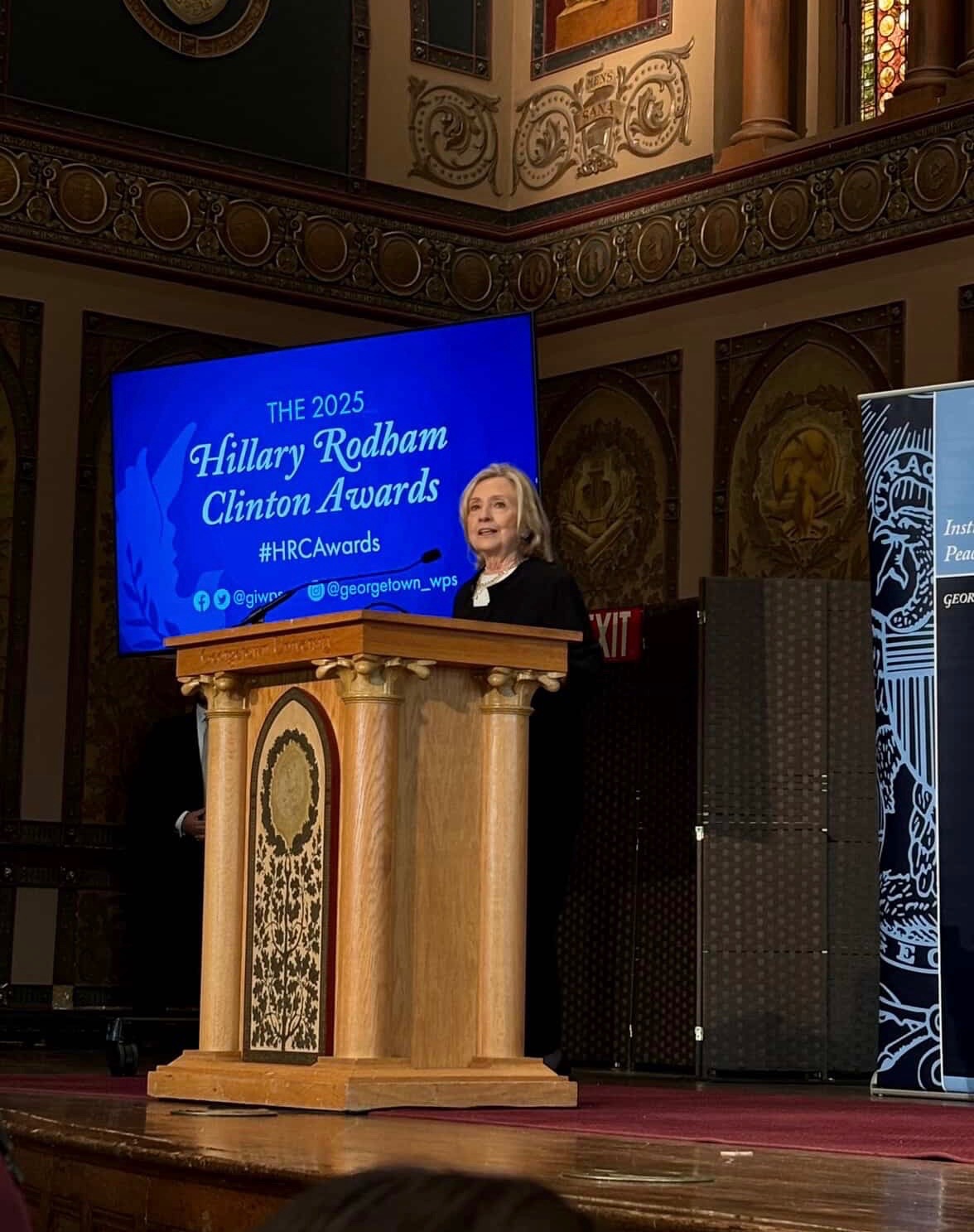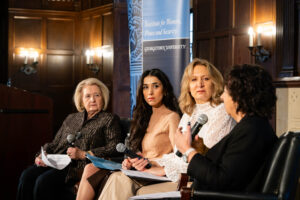The Georgetown Institute for Women, Peace and Security (GIWPS) hosted the annual Hillary Rodham Clinton Awards in Gaston Hall on Oct. 14. This year, the institute recognized Nobel Peace Laureate and co-founder of Rappler Maria Ressa, Pulitzer Prize-winning historian and Staff Writer for The Atlantic Anne Applebaum, women student protest leaders of Bangladesh, and Venezuelan women political prisoners.
The awards, named after the institute’s honorary founding chair, honor women across the globe for safeguarding democracy through media and mobilization.
Executive Director of GIWPS Melanne Verveer opened the ceremony, highlighting the importance of women’s participation in democratic peacekeeping.
“Peace, economic stability, and democratic ideals cannot exist without women’s rights and leadership, and the attacks on these rights are often the first warning signs of democracy declining,” Verveer said. “But as authoritarian threats grow, many women are not only resisting, they are leading the struggle against [the threats].”
Former U.S. Secretary of State Hillary Clinton then took the stage, providing insight on progress in women’s rights, such as the criminalisation of domestic violence, since the 1995 World Conference on Women in Beijing and the launch of GIWPS in 2011.
“The work has only grown more urgent, and it caused me to think about how far we’ve come, but how far we still have to go,” Clinton said. “With women’s equality and progress under attack worldwide, the need for the same courage and solidarity that we experience at Beijing could not be more urgent.”
Clinton reiterated the significance of women in peacekeeping, mentioning the gender disparities within these political fields and its negative impacts.
“Power and leadership is still dominated by men, with women being sidelined despite evidence— much of it coming from the Georgetown Institute for Women, Peace and Security—that women being involved in peacemaking and peace securing to make peace last,” Clinton said.
Maria Ressa, who Clinton called “the world’s most important alarm system,” was honored first.
After serving as a lead investigative reporter for CNN in Southeast Asia for nearly two decades, Ressa co-founded the Philippines’ first multimedia news site, Rappler, in 2012. The company became notable for exposing the weaponisation of social media under government corruption, as well as human rights violations in the Philippines. Ressa faced serious threats as a result, including attempted arrest and numerous accusations of tax evasion and cyberlibel. In 2021, she won the Nobel Peace Prize for her work.
While presenting the award, Verveer emphasized Ressa’s work combating the spread of gender disinformation. Verveer highlighted the urgency of these efforts, quoting Ressa’s 2021 Nobel Peace Prize speech that “‘the pandemic of misogyny and hatred needs to be tackled and tackled now.’”
Anne Applebaum was honored next. Labelled by Clinton as a “compelling voice for justice and a chronicler of autocracy,” Applebaum is considered a leading historian and author of Eastern and Central European communism. The writer has become an outspoken voice of authority on the consequences for democracy in the Russian invasion of Ukraine.
“She early on saw Putin as a threat to democracy and especially in her articles in The Atlantic, she has argued that the West has not adequately responded to Russia’s aggression against Ukraine,” Verveer said.
Accepting the award on behalf of the student protestors in Bangladesh was Tanjina Tammim Hapsa. Hapsa was central coordinator of the 2024 July uprising in Bangladesh, where Bangladeshi students protested political patronage, leading to a nation-wide movement demanding democracy.
Women have been at the forefront of the protests in Bangladesh, as student protest leaders specifically lead marches and rally public support as they confront military and riot police. The student protestors of Bangladesh received their award “for their commitment to justice, equality, and democracy,” even in an electoral autocracy.
A video featuring Dr. Nabila Idris was shown. Idris, a member of the interim government’s Commission of Inquiry on Enforced Disappearances, was introduced as the “bravest woman in Bangladesh,” by Verveer. In the video, Idris suggested that the student protests were just the beginning for Bangladesh.
“I accept [the award] not as an ending, but as an encouragement to keep working, to keep believing and to keep standing with all those who still wait for justice,” Idris said.
Accepting the award on behalf of the Venezuelan political prisoners were former political detainees Sairam Rivas and Virginia González. Alongside them was Geraldine Afiuni and Daneli Hernández, whose family members are currently imprisoned.
GIWPS originally sought to honour 2025 Nobel Peace Prize winner and Venezuelan opposition leader María Corina Machado for her tireless efforts to foster democratic rights and justice. Machado, however, wrote to the institute asking for the award to be a “collective recognition” of the movement.
“Especially the women victims and women political prisoners whose resistance is sacrifice embody the very spirit of this distinction,” Machado wrote to GIWPS. “I am convinced by shining a light on an entire movement that I’m able to have picked the highest prize.”
Verveer quoted Machado’s words honouring the Venezuelan prisoners while images of them were shown in a photo mosaic on the stage. She emphasised the prisoners’’ consistent prioritisation of justice and democracy over their own safeties.
“‘As Machado humbly wrote to us, ‘this distinction serves as a tribute to them, not to me, and as a testament to their courage, their sacrifice, and unwavering commitment to freedom,’” Verveer said.
After the honorees received their awards, Verveer asked the women, “what keeps you going in this increasingly difficult struggle?”
For the Bangladeshi student protestors, it is the hope that women’s suffering may come to an end.
“Women are suffering in the domestic sphere, they are suffering in international institutions, they are suffering in the street,” Hapsa said. “Once you tell every woman who are struggling in every corner of this world, just keep hoping and keep trying.”
When asked by a Georgetown student how the youth can navigate the space of security studies—especially a space dominated by strong Western voices—Ressa encouraged the listeners to understand and address the political issues they face.
“There is so much that is negative,” Ressa said. “But creative destruction means that if you acknowledge the world has been destroyed, you can now create, and you’re at Georgetown, girl, so create.”






